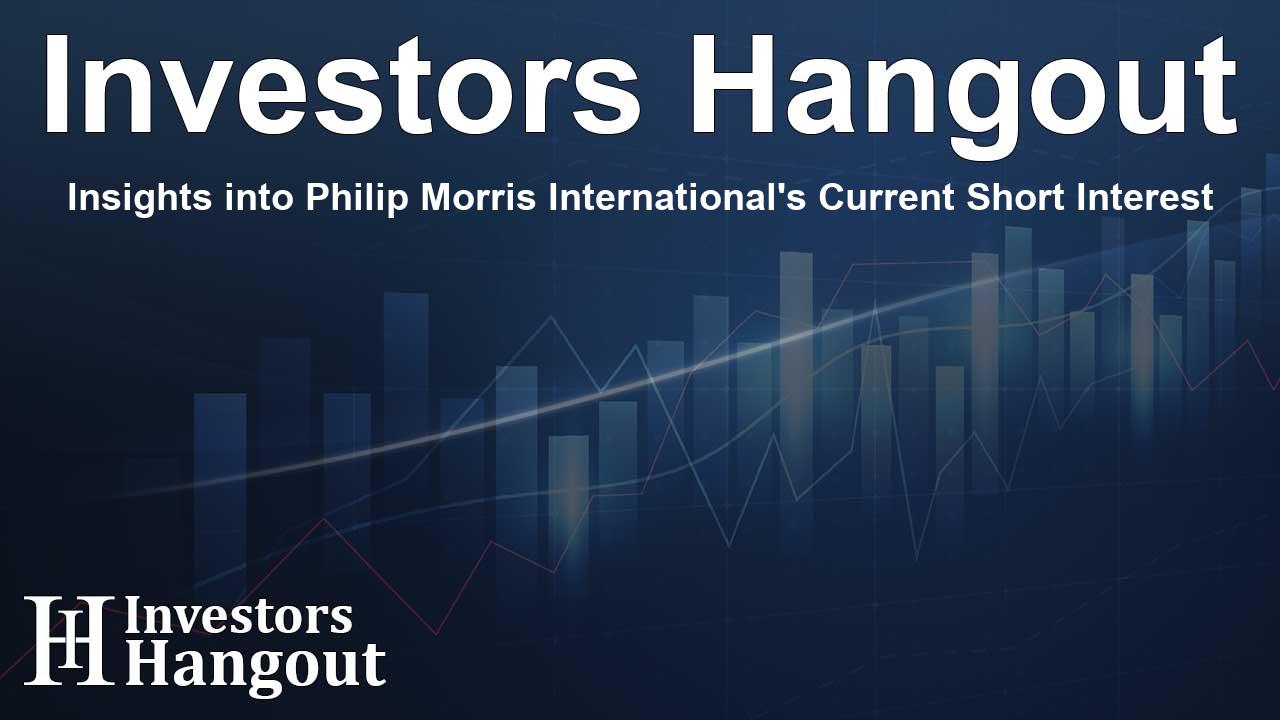Insights into Philip Morris International's Current Short Interest

Understanding Philip Morris International's Short Interest Dynamics
Philip Morris International's (NYSE: PM) short interest has experienced a noteworthy decrease of 28.12% since its latest reporting period. Currently, the company has around 7.16 million shares sold short, which accounts for 0.46% of all available regular trading shares.
What is Short Interest?
Short interest refers to the total number of shares that investors have sold short but have not yet repurchased or closed out. Essentially, short selling occurs when traders sell shares they do not own, betting on a decline in the stock's price. If the stock's value decreases, these traders can buy back the shares at a lower price, pocketing the difference. However, if the stock price rises, those traders face potential losses.
Monitoring short interest is crucial for assessing market sentiment regarding a particular stock. A rise in short interest often indicates that investors are adopting a bearish outlook on the stock, whereas a decline suggests a more bullish perspective.
Philip Morris International's Short Interest Trend
Recent trends indicate that fewer shares have been shorted in Philip Morris International. This decline in short interest is intriguing and suggests a shift in how traders view the company's stock. While it does not guarantee a rise in stock price, it does indicate a potential change in investor sentiment.
Comparative Analysis with Industry Peers
When assessing Philip Morris International's short interest, it's beneficial to compare it against its industry peers. Peer analysis helps investors gauge how well the company is performing relative to its competitors. The average short interest among its peer group stands at around 2.20%, indicating that Philip Morris International enjoys a lower short interest compared to its counterparts in the industry.
This information may provide valuable context for investors. When short interest decreases or remains low compared to peers, it may signify stability in the stock’s performance, which can foster investor confidence.
Interestingly, an increase in short interest can sometimes be viewed as a bullish signal. This is due to the possibility of a short squeeze, where a heavily shorted stock suddenly rallies, forcing short sellers to buy back shares, which can drive prices even higher.
Future Implications for Philip Morris International
As the market evolves, it will be essential to monitor Philip Morris International's short interest and overall market behavior closely. The current low short interest highlights a potential comfort level among investors regarding the company's prospects. Factors such as company performance, market conditions, and shifts in consumer preferences will continue to play a significant role in shaping stock sentiments.
Wrap Up
In summary, the recent decrease in Philip Morris International's short interest paints a picture of cautious optimism. Investors should remain vigilant, considering not just short interest levels but a broader array of market indicators as they make decisions.
Frequently Asked Questions
1. Why is short interest important for investors?
Short interest provides insight into market sentiment regarding a company's stock, helping investors gauge potential future price movements.
2. How is short interest calculated?
Short interest is calculated by dividing the total number of shares sold short by the total number of shares available for trading.
3. Can an increase in short interest be a positive sign?
Yes, a rise in short interest can lead to a short squeeze, which may push the stock price higher as short sellers rush to cover their positions.
4. How does Philip Morris International’s short interest compare to its peers?
Philip Morris International has a lower short interest percentage compared to the industry average, indicating more investor confidence.
5. What factors influence short selling activity?
Market conditions, company performance, and broader economic trends can all impact short selling activity among investors.
About The Author
Contact Olivia Taylor privately here. Or send an email with ATTN: Olivia Taylor as the subject to contact@investorshangout.com.
About Investors Hangout
Investors Hangout is a leading online stock forum for financial discussion and learning, offering a wide range of free tools and resources. It draws in traders of all levels, who exchange market knowledge, investigate trading tactics, and keep an eye on industry developments in real time. Featuring financial articles, stock message boards, quotes, charts, company profiles, and live news updates. Through cooperative learning and a wealth of informational resources, it helps users from novices creating their first portfolios to experts honing their techniques. Join Investors Hangout today: https://investorshangout.com/
The content of this article is based on factual, publicly available information and does not represent legal, financial, or investment advice. Investors Hangout does not offer financial advice, and the author is not a licensed financial advisor. Consult a qualified advisor before making any financial or investment decisions based on this article. This article should not be considered advice to purchase, sell, or hold any securities or other investments. If any of the material provided here is inaccurate, please contact us for corrections.
